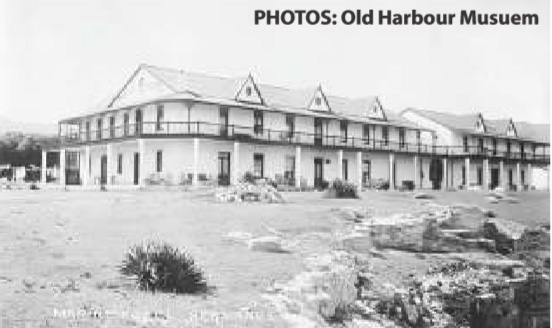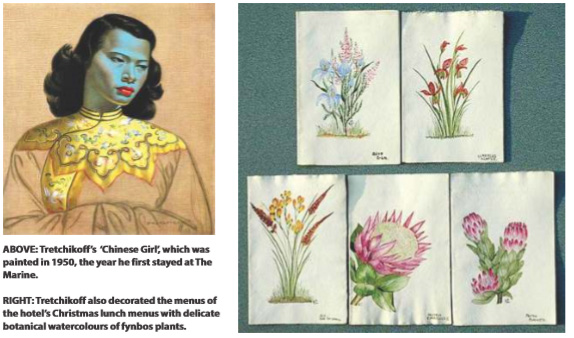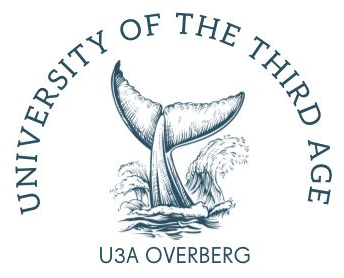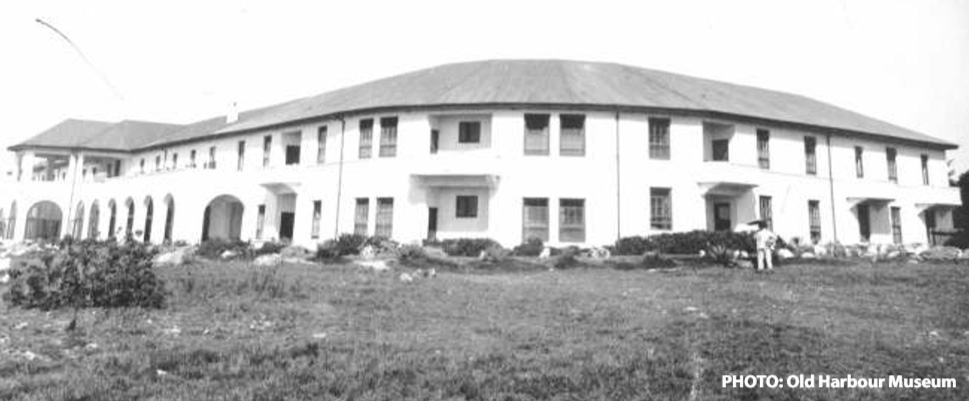
Hotels, holidays and the Hermanus economy: Part One
March 19, 2018History of Hermanus hotels: The Marine Part Three
March 23, 2018After the death, in 1940, of PJ Luyt, the hotelier who had turned The Marine into a highly successful and popular establishment, his resourceful widow Joey renamed the hotel as ‘Luyt’s Marine Hotel’. She managed it herself, with the help of her daughters and some dedicated staff, until 1947. By 1944 the hotel had developed further and aspects of the modern hotel were beginning to appear.
Joey and her daughters felt the full impact of World War II. Necessities of all kinds were severely rationed or simply not available. Their menus had to feature two meatless days a week and another two days on which only pork could be served. Sugar was rationed and white flour unobtainable. At the same time, new classes of people flooded into Hermanus, all looking for accommodation.
The vast majority of these were Allied troops from all the nations involved in the War. Some were on leave from ships transporting them to and from the various battlefields of the world. Some were South Africans or foreign troops permanently stationed in this country, for instance, the Royal Air Force personnel from the Catalina flying boat station on the Bot River Estuary. Sadly, still others were “wounded, convalescent… ill, disabled, shocked or trying to heal”, as Berdine Luyt wrote in her Memoirs.
Berdine describes how, at The Marine, they tried to fit in all comers. Some rooms were kept permanently vacant for soldiers (not officers), who had no way of booking in advance. Other servicemen slept in the billiard room, in the Luyt family’s own private sitting room, and in the sitting rooms of guests who had booked and paid for suites. And a blackout after dark did not seem to spoil the fun. However, it was all tinged with sadness, as Berdine herself writes: “We never knew which of all the brave boys we met, was having his last good time on this earth.”
Among the guests at The Marine during the Luyts’ tenure were: Sir Patrick and Lady Duncan; Edward, Prince of Wales; Sir de Villiers Graaff; Sir William Hoy; writers John Galsworthy, Pauline Smith, E H Sheppard, C Louis Leipoldt and Nicholas Monsarrat; and artists Pierneef, William Timlin and John Henry Amshwitz.
In 1947, Joey van Rhyn Luyt sold The Marine Hotel to a company, Continental Hotels and Restaurants Pty Ltd., a subsidiary of the L.H.C. Corporation of South Africa Ltd. The first manager appointed by Continental Hotels was Eric Constantine Colbeck who, with his wife Mary, managed The Marine at a level of service quite comparable to the Luyts. Colbeck is described in one document of the time as ‘a dapper Yorkshireman’ and he and Mary redecorated the interior in a more modern style and provided entertainment that was very popular. The hotel remained the drawcard it had long been and further additions were made to the buildings. In the 1950s, several cottages to the east of the hotel itself were purchased and demolished to allow a block of additional bedrooms to be built.
We know from other sources that the controversial artist Vladimir Grigoryevich Tretchikoff (1913-2006) –  universally known by his surname only – visited The Marine Hotel with his wife and daughter in 1950 and 1951. Before that, in 1942, Tretchikoff’s wife and daughter had narrowly escaped the fall of Singapore where they were living at the time. Tretchikoff himself was captured by the Japanese forces and spent several years in a concentration camp. He survived this and caught up with his family in Cape Town in the late 1940s. He immediately started to produce paintings in a distinctive and very popular style. In the 1950s, he exhibited in Los Angeles, San Francisco and London. In 1950 (the year he first stayed at The Marine) he painted the ‘Chinese Girl’, which has become the original of the best-selling art print in history and was itself sold in 2013 for R17 million.
universally known by his surname only – visited The Marine Hotel with his wife and daughter in 1950 and 1951. Before that, in 1942, Tretchikoff’s wife and daughter had narrowly escaped the fall of Singapore where they were living at the time. Tretchikoff himself was captured by the Japanese forces and spent several years in a concentration camp. He survived this and caught up with his family in Cape Town in the late 1940s. He immediately started to produce paintings in a distinctive and very popular style. In the 1950s, he exhibited in Los Angeles, San Francisco and London. In 1950 (the year he first stayed at The Marine) he painted the ‘Chinese Girl’, which has become the original of the best-selling art print in history and was itself sold in 2013 for R17 million.
At The Marine Eric Colbeck scared the more conservative guests by asking Tretchikoff to decorate the menus for the Christmas lunches. To everyone’s surprise he did so with delicate botanical watercolours of fynbos. Nothing more different from his usual style can be imagined.
Eric Colbeck was followed by a succession of managers, but they were unable to keep up the standards of the past. Continental Hotels was reluctant to invest further capital in the hotel and the old main building deteriorated rapidly. In 1967 The Marine was bought by Swiss-born Werner Hinder, who already owned the famous Arthur’s Seat Hotel in Sea Point, Cape Town. Extensive alterations were undertaken, including the construction of a new wing, the San Marino. These extensions consisted of a more modern block of bedrooms, a restaurant and an outdoor swimming pool. An abortive attempt was made to open a casino in the 1970s.
Robert Halkett, the grandson of P J Luyt’s brother Alewyn, recalls Joey Luyt in the context of their Schoongezicht home on the corner of Main Road across from the hotel and her florist shop in the grounds of the house. His branch of the family now lives in Cape Town, but retain a house in Fourie Street in Hermanus. He remembers the San Marino’s swimming pool adjacent to the main building which he and his friends used on occasion. However, they preferred the Marine tidal pool at the foot of the cliffs in front of the hotel. This had been opened in 1924. The Marine and San Marino were poorly managed at this time (in the 1960s) and some of the boys would actually occupy vacant rooms in San Marino overnight, without permission, and then, masquerading as guests, eat a full English breakfast the next day for 50c.
Circumstances dictated that Berdine and Paddy Luyt reexperienced The Marine Hotel in the early 1970s. They both worked there under Werner Hinder when the hotel was deteriorating. Only Berdine recorded her impressions in a general tone of bemused amazement at the behaviour of successive managers. This helps us to accept the reality of incidents that often defy belief, and on one occasion resulted in a manager spending time in the cells at the Hermanus Police Station, charged with fraud. Berdine’s previous experience of running the hotel herself gives her a yardstick to measure how far from satisfactory these managers were, but she keeps sympathy with them and is genuinely distressed when Mr. Coleman is incarcerated.
No further investment in The Marine was forthcoming, and the hotel was allowed to run down during the late 1970s. Hinder was glad to sell it to David Rawdon in 1980.


